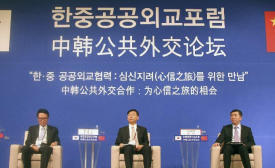china
Congratulations are in order for CPD as Jay Wang took the helm this fall and began engaging with the public diplomacy community as the new CPD director. As often happens with such beginnings, the focus intuitively turns to the future. I would like to suggest a counter-intuitive move and challenge public diplomacy scholars around the world to explore the contributions of ancient heritages to the practice of public diplomacy.
Numerous governments and citizens throughout the world would like to see an effective counterbalance to China in East Asia. Korea, with its commitment to democracy, sophisticated economy, and long-established ties to the United States and other Western countries, is in a strong position to play this role, if it chooses to do so.

SEOUL --- At a conference here sponsored by the Korea Foundation, several dozen scholars and practitioners grappled with questions related to Korea’s global and regional diplomatic posture. My own suggestions as a conference participant centered on two questions
• How does public diplomacy relate to the strategic interests of Korea as a leader in East Asia and more specifically as a counterweight to Chinese influence?
• In what ways might new media be used to enhance Korea’s development of innovative public diplomacy programs?
What's the best evidence that things are really changing in the Mideast? It is the spectacle of Israel and Saudi Arabia, hitherto America's two closest allies in the region, glowering darkly on the sidelines (and more or less in unison) as the United States and Iran begin an engagement that is already more profound than anything we've seen since the Iranian revolution of 1979. This historic shift, punctuated by the signing Saturday of a six-month, nuclear-freeze deal that both Israel and Saudi Arabia had loudly opposed, could potentially transform the entire region.
When Vietnamese Prime Minister Nguyen Tan Dung, meeting with his Chinese counterpart Li Keqiang, announced the decision to establish the first Confucius Institute, at Hanoi University, Vietnam, the news stirred considerable controversy among Vietnamese intellectuals. Any move by the Vietnam’s communist government that smacks of dependency on China is likely to prompt protest. However, setting up a Confucius Institute, with its overtones of cultural hegemony, may only be distracting the Vietnamese public from more substantial concerns.
This week, Eric Schmidt, Google's executive chairman, was quoted as saying during a speech in Washington: "We can end government censorship in a decade. The solution to government surveillance is to encrypt everything." Earlier this week, we at greatfire.org successfully unblocked the Reuters Chinese website, which had been blocked on 15 November. We also unblocked the China Digital Times website, which has been blocked in China for years and earlier this month created mirrors for our FreeWeibo project.
There’s been a lot of talk these days that globalization is dead, even reversing — and for good reason. It seems that many of the factors that had been driving globalization have run out of steam. The growth of trade, which has long outpaced the expansion of the world economy, has slowed in recent years. Negotiations to forge a new global-trade agreement, the Doha Round through the World Trade Organization, have been stalled for years.
A week ago, Taiwan enjoyed formal diplomatic relations with 23 countries, largely concentrated in Africa, Latin America, and the Caribbean. As of November 15, that number is down to 22, thanks to a surprise announcement by Gambian President Yahya Jammeh that his country would cut its diplomatic ties to Taiwan. As J. Michael Cole wrote elsewhere on The Diplomat, it’s unclear whether The Gambia will officially establish diplomatic relations with China, and what that would mean for the “diplomatic truce” between China and Taiwan.







